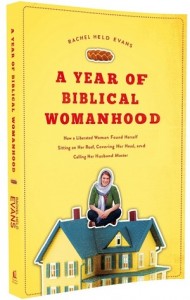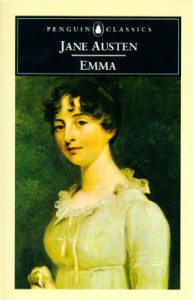Here are the questions I ask and answer on the first of each month.
The questions, as always, are:
first, what are you reading?
what do you like best about it?
what do you like least?
what’s next on your list to read?
As always, I hope you’ll consider your current reads on your blog and/or sharing here in the comments or on Facebook or Twitter. Happy reading!
First, what are you reading?
A Year of Biblical Womanhood by Rachel Held Evans.
Emma by Jane Austen for a book group.
What do you like best about them?
I find myself jealous these days when I read excellent prose, because I find writing painfully difficult, often impossible, this week/month/year, and I’m rarely happy with the result when I do finally finish a column/project/etc.
Rachel Held Evans writes really, really well, but I’m not holding it against her because A Year of Biblical Womanhood is so darn interesting. She spends each month of a year trying to live out a different biblical womanly virtue–obedience, valor, etc. It’s a bit artificial of a concept, but her writing carries the narrative. This book made me think of women in Scripture differently, it introduced me to the concept of “a woman of valor” (making Proverbs 31 a poem and a praise of all women do, not a “job description”–wow, that’s probably my one big take-away from this book), and just overall was a diverting, thought-provoking read.
Here’s just one great quote from this book (in the chapter on Proverbs 31: .
“Somewhere along the way, … we abandoned the meaning of the poem by focuing on the specifics, and it became just another impossible standard by which to measure our failures. We turned an anthem into an asignment, a poem into a job description.”
Most of all, reading A Year of Biblical Womanhood made me so enormously grateful to be a Catholic and understand that as a woman there are myriad ways to be holy. Evans is one of those non-Catholic authors who make me think, “wow, she’d be such an awesome Catholic.” I don’t mean this in a holier-than-thou way–she ponders more about spirituality and Scripture before breakfast than I do in a month–but imagine her writing and life informed by the saints (like, say St. Edith Stein, or St. Therese) and nourished by the Eucharist.
As far as Emma goes, it’s practically perfect in every way. I have a lot of great quotes highlighted. This is a terrific feature of reading a book on a Kindle App. You can highlight a sentence or two, and then pull up all those highlights on any device. This to me is a true advantage of e-reading versus real books.
One very fun expression I had not remembered from Emma was people being “come-at-able” because they were always willing to make up a dinner party at Emma’s house–they were willing and able to join in. Emma does not necessarily consider it a positive, but at this point in the novel she’s still in her clueless, teenage, “know-it-all” phase. And I do consider being “come-at-able” or flexible and willing to join others, is a good quality.
What do you like least about them?
A Year of Biblical Womanhood is not perfect. There are lots of examples of this, and I don’t want to nitpick, but if do read it you might find yourself annoyed at various points as I did. Here is just one “for instance”: she appears more tolerant of the conservative modesty and religious values of a Jewish woman than of conservative Christians, perhaps because her Jewish friend is able to articulate her point of view so well.
It also makes me unnaccountably sad that she and her husband do not want to have children.
Emma, can I say again, is near-perfect in every way, so nothing not to like. Emma herself is fairly cringe-worthy at so many times because she’s young and clueless. This time through, I am for the first time actually reading it from the perspective of Emma’s dead mother, rather than Emma herself. Interesting, and also a transition.
What’s next on your list?
I’ve just started Margaret Wise Brown: Awakened by the Moon by Leonard S. Marcus, and it is so good. I want Leonard Marcus’ job when I grow up: to write thoughtful biographies about the authors of children’s books.
What are you reading this month?

